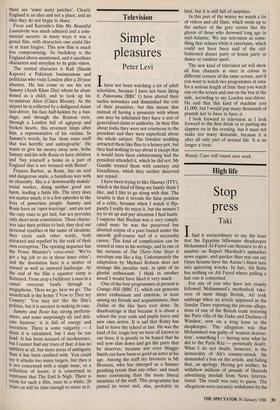Cinema
Sammy and Rosie Get Laid ('18', Lumiere)
Preaching hell-fire
Hilary Mantel
Discerning people nowadays lament the decline of the sermon; we don't get the genuine article, they say, and especially not the rousing brimstone variety that the Victorians were accustomed to. But Sam- my and Rosie — let's for brevity and decency adopt the US title — is the modern cinematic equivalent: full of sym- bols and rhetoric, short on human sym- pathy, and designed to nail us to our seats with fear of the future.
Its merits are now obscured by a big fight about the aims and methods of recent British films. In the blue corner, we have Norman Stone, the Oxford. historian, who finds a sample of such films to be 'worth- less and insulting'. He believes that there is something rotten in the film industry, which young directors are projecting onto the nation at large. What does he like? Well, the Ealing comedies were very jolly, and nowadays thank goodness there's Merchant-Ivory. In the red corner we have Hanif Kureishi and Stephen Frears, writer and director of this film, Derek Jarman and other low-budget film makers; the gist of their reply is that Norman Stone is an intellectual bully and nostalgia-merchant who has no right to his opinion anyway, as he is not a film critic.
It is not a real debate. To conduct an argument you need some common ground. Hanif Kureishi says that he feels England is 'an intolerant, racist, homophobic, narrow-minded authoritarian rat-hole run by vicious, suburban-minded, materialistic philistines'; Norman Stone concedes that there are 'some nasty patches'. Clearly England is an idea and not a place, and an idea they do not begin to share.
Frear and Kureishi's film My Beautiful Laundrette was much admired and a com- mercial success; in many ways it was a genial film, with characters one could like or at least forgive. This new film is much less compromising. Its backdrop is the England above-mentioned, and it sacrifices characters and storyline to its grim vision. The central character is Rafi (Shashi Kapoor) a Pakistani businessman and politician who visits London after a 20-year absence. He has come to see his son Sammy (Ayub Khan Din) whom he aban- doned as a child; and to look up his ex-mistress Alice (Claire Bloom). At the airport he is collected by a disfigured Asian taxi-driver, his face half-hidden by a ban- dage; and through the Brixton riots, through a London full of agitprop and broken hearts, this revenant limps after him, a representative of his victims. In Sammy's words, he has 'done some stuff that was horrific and unforgivable'. He wants to give his money away now, bribe Sammy and his wife Rosie to have children and 'buy yourself a home in a part of England that is not twinned with Beirut'.
Frances Barber, as Rosie, has an acid and dangerous smile, a fastidious way with an obscenity. She is a 'downwardly mobile' social worker, doing neither good nor harm, leading a futile life. The story does not matter much; it is a few episodes in the lives of powerless people. Sammy and Rosie have an 'open marriage', and are not the only ones to get laid, but sex provides only short-term consolation. These charac- ters take their politics to bed; they deal out personal cruelties in the name of idealism; they circle each other warily, both attracted and repelled by the reek of their own corruption. The opening sequence has the Prime Minister's voice-over: 'We've got a big job to do in those inner cities'; and the desolation here is a matter of Inward as well as outward landscape. At the end of the film a squatter camp is flattened. From atop a bulldozer a man in a camel overcoat bawls through a megaphone, 'Here we go, here we go.' The soundtrack is the hymn 'I Vow to Thee my Country'. You may not like the film's Politics, but it is succinct in making its case.
Sammy and Rosie has strong perform- ances, and some surprisingly sly and deli- cate humour; it is full of energy and invention. There is some vulgarity — I think it is calculated, but I may be too kind. It has been accused of incoherence, but I cannot find any trace of that; it has no subtlety at all, but more areas of ambiguity than it has been credited with. You could say it attacks too many targets, but then it Is not concerned with a single issue, or a collection of issues; it is concerned to represent that The End Is Nigh. There is room for such a film, once in a while; 20 years on will be time enough to sneer at it.



















































 Previous page
Previous page